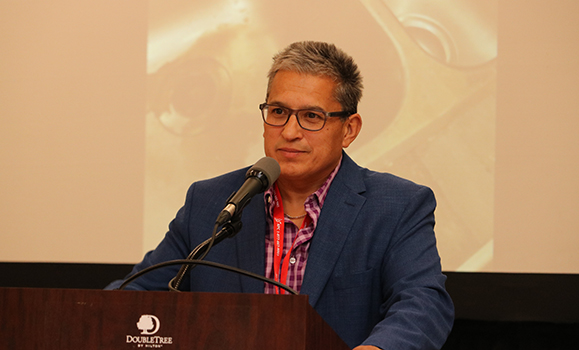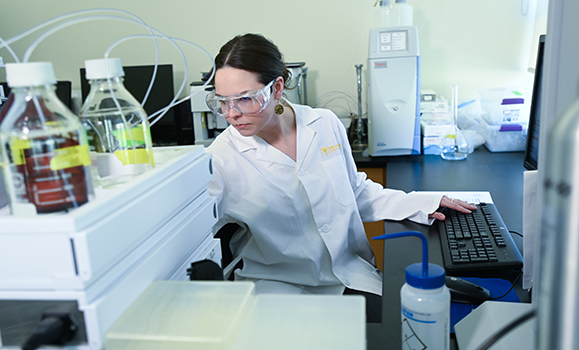The Atlantic First Nations Water Authority (AFNWA) made history in 2018 by incorporating as the first Indigenous-owned and -led water utility in Canada. It was a significant step for First Nations in the region toward self-determination and control of the resource that is central to the health of their communities and protection of the environment.
Now, a new $4.3 million NSERC Alliance-Mitacs Accelerate Grant will support a partnership between the AFNWA and Dalhousie University to help the organization in its mission to deliver world-class drinking water and treatment guided by Indigenous knowledge and values.
The new partnership will support the AFNWA in improving the quality and sustainability of community infrastructure, strengthening safety and risk management, and engaging community members to ensure they are informed and empowered.
Underpinning the priorities of the partnership is a plan to train a new generation of Indigenous and non-Indigenous engineers and other professionals to ensure the water authority’s long-term success. This will include 20 graduate and postdoctoral research trainees, 15 undergraduate interns, and 35 First Nations high school students in Mi'kmaq and Wolastoqey communities.
Chief Wilbert Marshall, chair of the AFNWA’s board of directors.
Chief Wilbert Marshall, chair of the AFNWA’s board of directors says, “Training students, with a focus on recruiting and training Indigenous students, will help build a strong foundation and set the AFNWA up for long-term success.” He adds that new opportunities for First Nations students for training and employment will also be beneficial to communities they serve.
Taking control
Since late 2022, 12 of the 34 First Nations communities in Atlantic Canada joined the AFNWA, with two more expected to join this year. In the process of establishing the authority, it quickly became apparent that the infrastructure the organization would assume responsibility for suffered from serious deficiencies – the result of decades of chronic underfunding, says James MacKinnon, the AFNWA’s director of engagement and government relations.
“Before the AFNWA, Indigenous peoples’ water and wastewater systems were operated and managed by the individual bands relying on Indigenous Services Canada for annual funding for maintenance and infrastructure upgrades. However, the funding fell far short of the resources needed,” says MacKinnon, who also notes that the short-term funding model made long-term planning extremely difficult.
By bringing First Nations together under the auspice of the AFNWA, it obtained dependable funding based on 10-year cycles that allowed them to consider strategic investments in infrastructure and staffing. With this support in place, the new organization’s board of directors, comprised of member Chiefs and technical experts from Indigenous organizations, approached long-time partner Dalhousie to help chart the path forward.
A natural choice
“The AFNWA recognized early on that they were going to be a leader in this space, but that partnering with an academic institution could provide strategic support and training of Indigenous and non-Indigenous engineers to help ameliorate gaps and address long-standing inequities,” says Dr. Megan Fuller, the director of research for the AFNWA at Dalhousie’s Centre for Water Resources Studies.
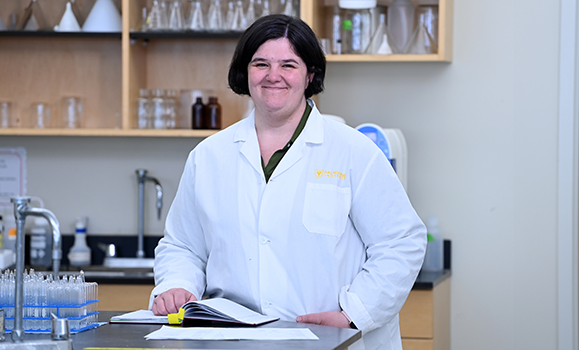
Dr. Megan Fuller, director of research for the AFNWA at Dalhousie’s Centre for Water Resources Studies. (Danny Abriel photo)
Dalhousie was the natural choice, she says, since it already had a long-established relationship with the First Nations focused on water safety. The connection was made through the work of Dr. Graham Gagnon, who leads Dal’s Centre for Water Resource Studies and who has been an advocate for the improvement of Indigenous water services in Nova Scotia for more than a decade.
Dr. Gagnon is the lead researcher on the partnership from the Dalhousie side. He is joined by Dr. Amina Stoddart, Dal’s Canada Research Chair in Wastewater Treatment Technology and Surveillance, who will play a key role in helping the AFNWA assess new infrastructure and process requirements. Dr. Chad Walker will join from Dalhousie’s School of Planning to support the AFNWA’s development of Indigenous-led governance and community engagement.
Researchers at Dal’s Centre for Water Resource Studies in action. (Danny Abriel photo)
A pipeline of talent
In addition to building new education and training pathways for Indigenous students, the partnership will create a course at Dalhousie focused on integrating Indigenous Ways Knowing into traditional engineering curriculum. Guided by the AFNWA’s Elders Advisory Lodge – the First Nations Elders and knowledge holders who advise the AFNWA’s board – Dalhousie is creating a program that will empower students to see their work through an Indigenous lens. Known as Two-Eyed Seeing or Etuaptmumk, the course’s content will help students see their work from an Indigenous perspective and combine it with western knowledge to enhance their learning.
“This will be the first class of its kind and I want students to take away everything they can,” says Elder Methilda Knockwood-Snache, chair of the AFNWA’s Elders Advisory Lodge. “The concept of Two-Eyed Seeing – seeing western science and traditional Indigenous knowledge as equals – is much needed for youth to understand where they came from and have pride in who they are. This class will teach new perspectives and allow students to work together and be the change we want to see. This type of work is the work I live for.”
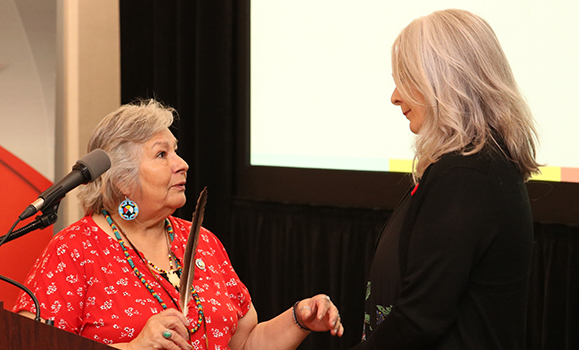 E
E
lder Methilda Knockwood-Snache, Chair of the AFNWA’s Elders Advisory Lodge with Patty Hajdu, Canada’s Minister of Indigenous Services.
Once graduate students have the necessary background in Two-Eyed Seeing, Dr. Fuller says they will take leading roles in helping to answer high priority research questions the AFNWA wants to address. This includes contending with how best to improve outdated and inadequate drinking and wastewater treatment systems.
“There are 10 years of capital upgrades that are coming down the pike for these communities. So, Dal’s Centre for Water Resource Studies and the Indigenous and non-Indigenous trainees associated with this work are going to think about what good treatment looks like and what treatment processes should be employed, so that investments can be made to ensure drinking water is safe and clean for everyone,” says Dr. Fuller
Students will also support the AFNWA’s corrosion control program, a process that is commonly conducted in municipalities across Nova Scotia and New Brunswick to limit lead exposure through drinking water.
“It's not something that the federal government has prioritized in the past,” says Dr. Fuller. “So, we now can go through and deal with the lead problems that may be found to be occurring in these individual residences for the first time.”
‘LED-ing’ the way
Dr. Gagnon says that beyond best practice, Dalhousie’s partnership with the AFNWA will help the First Nations take a global lead in the treatment of wastewater. Currently much of the world’s wastewater is treated using UV lamps that rely on toxic mercury vapor to generate their light.
As part of the partnership, Dal researchers and students will conduct a pilot study with the AFNWA focused on the implementation of UV light emitting diodes (LEDs). The technology has the power to disinfect without the risk of mercury escaping into water systems, while also consuming significantly less energy.
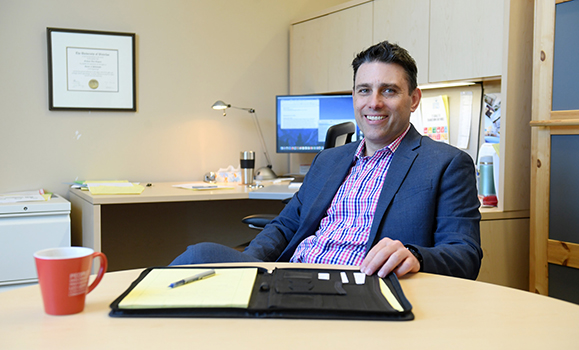
Dr. Graham Gagnon, director of Dalhousie’s Centre for Water Resource Studies. (Danny Abriel photo)
“It's very exciting because the AFNWA is essentially going to be leading the water community in North America in this trial,” says Dr. Gagnon. “It's based on principles and values that they have in terms of sustainability. And it's very exciting for us to be a part of this study, guided by their strong vision and values, to make advances that matter.”


